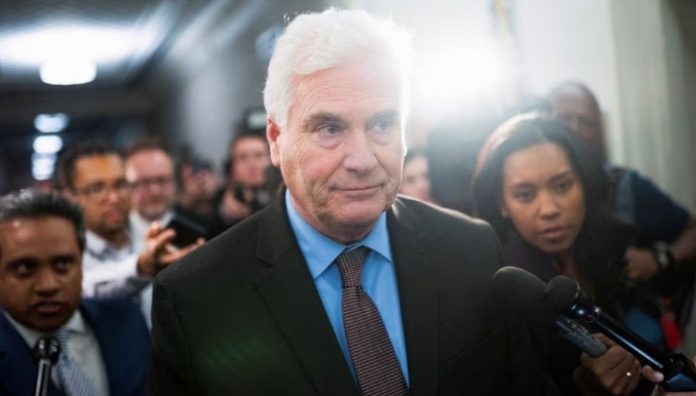Three weeks after Kevin McCarthy was ousted as House Speaker, Republicans face the challenge of nominating a new candidate to fill the vacant seat in order to pull together a fractured GOP majority and get back to the work of running Congress, according to The State.
After resigning their speaker and rejecting two popular figures as his replacement, House Republicans on Tuesday will choose their second-highest-ranking speaker after the president from a pool of little-known congressmen. They could spend all day in closed-door session choosing a new speaker. Dusty Johnson, R-S.D., a conservative caucus leader, said:
“We’re going to have to figure out how to get our act together — I mean, big boys and big girls have got to quit making excuses and we just got to get it done.”
There are many candidates on the list, but there is no obvious front-runner among them yet. The list includes Majority Whip Tom Emmer of Minnesota, a grumpy former hockey coach who has turned to Donald Trump for support; newcomer Byron Donalds of Florida, a well-loved Trump ally; former McDonald’s franchise owner Chancellor Kevin Hearn of Oklahoma, a conservative leader; and a host of others.
It is assumed that no candidate will be chosen on the first ballot and Republicans will vote until they can agree on a nominee. Some insist on signing a pledge to abide by the rules and support the winner of the majority vote, but there are those opposed. The House vote is scheduled to take place later this week. Donalds said, after a candidate forum late Monday evening:
“I feel good, but it’s up to the members — it’s in their hands now.”
Without a speaker since early October, the House of Representatives has been in complete disarray. McCarthy was previously ousted by a group of intransigent Republicans, creating a total crisis of governance in Congress.
If Congress fails to pass funding legislation by 17 November to keep services and offices running, the Federal Government could shut down within weeks. President Joe Biden has asked Congress for $105 billion to provide aid to Ukraine and Israel and to strengthen the US border with Mexico. Without action, federal aviation and agriculture programmes will expire.
Speaker candidates are mostly conservatives and election deniers who either voted against confirming the results of the 2020 presidential election, when Biden defeated Trump, ahead of the attack on the Capitol on 6 January 2021, or joined a subsequent lawsuit challenging those results.
Florida Representative Matt Gaetz, the far-right leader who orchestrated McCarthy’s ouster, said some of the contenders – Hern, Donalds or Representative Mike Johnson, a constitutional law expert from Louisiana – would be “phenomenal” choices for speaker. Also vying for the speaker’s post are Reps. Austin Scott of Georgia, who once challenged Jordan with a protest bid, Jack Bergman of Michigan, Pete Sessions of Texas and Gary Palmer of Alabama. Pennsylvania Representative Dan Meiser withdrew his candidacy.
Gaetz and hard-liners are confronting a leader who joined in voting for the budget agreement McCarthy struck with Biden earlier this year that set a level of federal spending that far-right Republicans disagree with and now want to repeal. They want to make tougher cuts to federal programmes and services as the funding deadline looms next month.
Rep. Marjorie Taylor Green said she needed assurance that the candidates would investigate the impeachment of Biden and other top Cabinet officials. Republicans held a meeting late Monday night to hear brief speeches from congressmen running for the job – “elevator pitches” ahead of Tuesday’s intraparty vote. They also heard from constituents who want them back in office and appear ready to try to move on. Rep, Nick LaLota, a more centrist New York Republican after the hours-long session, said:
“There seems to be some sort of compromise in the room.”
Senior among the contenders is Emmer, and he and others are asking for Trump’s support. Trump said:
“They all called asking for support.”
Trump has underestimated and sometimes even mocked Emmer, the third-ranking Republican in the House with whom he has an uneasy relationship, portraying himself as a kingmaker who talks to “many congressmen” who want his support. Trump said:
“I think he’s my biggest fan now, because he called me yesterday and told me I’m your biggest fan.”
However, factional games are strong on Capitol Hill between the so-called “five families” that make up the House Republican majority.
It is now unclear what House Republicans are fighting over and whether they will be able to choose a more acceptable speaker. Trump has intervened from the sidelines, backing hard-line Representative Jim Jordan to replace Majority Leader Steve Scalise. But last week, Republicans withdrew Jordan as their nominee in part because of hardball tactics, including death threats from supporters of the Ohio Republican. Johnson of South Dakota said:
“Most of these guys and gals can’t be bullied to do anything. You’re gonna have to use persuasion.”
Trump was offered to take the gavel on Monday, but he declined and said no one was capable of uniting Republicans in the House. He declared in New Hampshire:
“There’s only one person who can do it all the way: Jesus Christ,”.
Nominal interim Speaker Patrick McHenry, a North Carolina state representative, heads the whole mess in the House. He chairs the Financial Services Committee, whose main job is to elect a permanent Speaker. Some Republicans and Democrats – would like to give McHenry more power so he can get on with the routine work. However, McHenry, who first held the post, which was created after the 11 September 2001 terrorist attacks as an emergency measure, rejects the idea.
